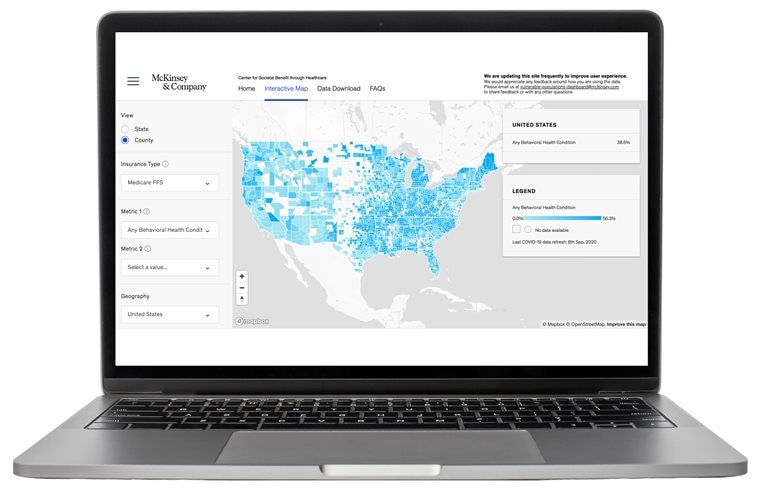Of the many ways COVID-19 is straining society, the rise of behavioral health challenges (i.e., mental and substance use disorders) has been among the most invisible so far. But according to McKinsey partner Erica Coe, that’s beginning to change. “More people are paying attention to mental health now amid the pandemic given spikes in drug overdoses, anxiety, depression, and insomnia,” she explains.
Supporting mental health for our society

Erica is a co-leader of our Center for Societal Benefit through Healthcare. Launched last summer, the center was established to improve healthcare globally by working in areas that are highly valuable to society—such as mental health, substance use, social determinants of health, maternal health, and rural health—but not necessarily highly invested in.
A core component of its work since launch and throughout the pandemic has been a partnership with the non-profit Shatterproof—which works to fight substance use disorder in the U.S. Our efforts with Shatterproof have focused on developing a national strategy to help reduce the stigma around opioid addiction, with the goal of ensuring that addiction is viewed and treated with the same urgency and compassion as other chronic conditions.
“Addressing mental and substance-use disorders feels that much more critical now under COVID-19 given how ubiquitous the challenges are,” says Erica. “It impacts all ages and backgrounds, and with serious implications for life expectancy, physical health, and quality of life.”
In addition to being a human tragedy across many fronts, COVID-19 is affecting nine out of ten employers across their workforce behavioral health and productivity. That impact can cost companies; for instance, the loss of productivity due to mental health conditions can be as high as $1 trillion per year. Making progress on this front won’t happen through one-off initiatives, Erica explains. “We're committed to sharing insights and results from the Center's projects in an external, open-access way, so others can replicate what proves effective” she says. “We know that to really move the needle across these issues that are so deeply relevant to society, we must collaborate around innovation.”

One way the Center is enabling this kind of collaboration is through its open-access dashboard that highlights COVID-19’s impact on individuals with physical health, behavioral health, and social and economic vulnerability. Through analytics, the dashboard leverages data of insured individuals to identify where these populations are located and helps inform solutions to support them. By processing over 15 million American health claims, the dashboard can help identify geographic hotspots with relatively higher concentrations of people at greater risk for COVID-19—and the targeted interventions (e.g., behavioral health supports) to help them.
For instance, one psychiatrist at a large health system used the tool to compare the state and county behavioral health demand with the supply of psychiatrists and psychologists and other mental health providers. With that information in hand, she was able to make a case for prioritizing additional hiring. Complementing the dashboard, the Center has launched an array of publications, podcasts and articles to shine a light on the many behavioral challenges exacerbated by COVID-19 and how organizations around the world can mitigate the outcomes on vulnerable populations.
Helping fight stress for frontline workers through pro-bono work
The need to manage stress and bolster emotional wellbeing during the pandemic is especially significant for at-risk groups, like frontline healthcare workers. To that end, leaders of Aberkyn, a McKinsey company of change facilitators, and our Middle East office partnered in May with the Abu Dhabi Authority for Social Contribution Ma’an to offer a series of pro-bono mindfulness coaching sessions and renewal workshops for Sheikh Khalifa Medical City staff.
Thirty-two staff members received training through 90-minute sessions on how to build team resilience and deep connections with themselves and others to maintain relationships. Since then, Aberkyn has led multiple pro-bono virtual workshops for other healthcare clients both within the Middle East and globally.
Healthcare workers at the very frontline of COVID-19 work under high stress conditions while providing care for patients. "Offering these people an opportunity to step outside from their daily action and reflect, renew, and re-energize among colleagues makes a big difference,” say Aberkyn leaders Rawan Albina and Annette Kirby, who have been leading these mindfulness sessions for healthcare workers in the Middle East.
Supporting mental health inside our firm
According to Kana Enomoto—a senior expert at McKinsey who specializes in behavioral health —more and more companies are prioritizing investments in employees’ mental and emotional wellbeing. “Mental health is an important dimension of diversity and inclusion. It’s crucial to financial survival and to future-proof businesses for the next generation,” she says.
Our firm is among them. In addition to a variety of flexible work options, a firmwide program called Mind Matters, launched in 2019, provides 24/7 intervention support in multiple languages and increases awareness around mental health and substance use issues for all 30,000 firm members. What started as just a few offices with their own initiatives, speakers, and events has quickly expanded to a global effort. Today, there are trained mental health points of contact in all of McKinsey’s 150-plus locations who are able to direct colleagues to the best available resources.
The program has perhaps never been more impactful than now. Sofi Ureña, a senior trainer, used the program to help address challenges she was experiencing because of isolation during quarantine. “I was surprised by how safe and at ease I felt on the phone,” she says. After two calls, Sofi says she’s gotten into the practice of writing her feelings down on paper to help identify what triggers a panic attack and is better able to communicate emotions with her husband and therapist.
And for Feifei Sun, an executive editor now based in Atlanta, travel bans meant she needed to find mental health support while sheltering in place outside of what was then her home city. “When I couldn’t return to see my usual therapist, I used Mind Matters to connect quickly with a professional in my new location,” she says. “Having that kind of support was critical as I was going through such a transitional time.”
If you’re feeling overwhelmed by anxiety or depression, please contact a crisis help line in your country. If you are a leader who is concerned about mental health challenges in your organization, please refer to these resources from the World Health Organization and the U.S. Centers for Disease Control. There are many actions that employers can take, including examples from: City Mental Health Alliance, One Mind at Work, and Shatterproof.